'I missed out on university but my son won't'
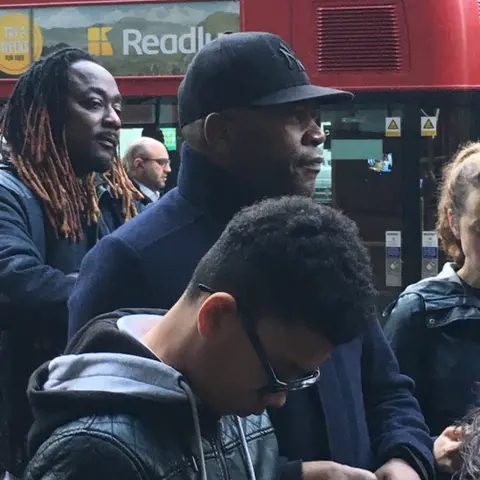 BBC
BBC"I didn't hear the word university until after I had left school but I know I could have done well."
Daniel Bennett from Kennington in south London is a heating engineer.
He did a four-year apprenticeship straight out of school and makes a good living but doesn't want his son to follow in his footsteps.
"I was quite smart but I didn't know it. I was very quiet and sat in the background. No issues, no trouble but I got no encouragement from teachers."
"That's one thing that's not going to happen to him," he says of 11-year-old Darntá
Daniel has the day off work to take Darntá on a coach trip to Cambridge with a group of like-minded parents of 11-to-14-year-olds who are part of a project run by King's College London and community action organisation Citizens UK.
Darntá, in common with the other pupils on the trip, has been identified by his school as having academic potential - but also, like the others, he comes from a family with no tradition of university.
The parents are ambitious for their children but fear their own lack of university experience could hold their children back.
Many also worry about paying for expensive private tuition or summer schools which can give better-off children the edge when it comes to applying to competitive universities.
And then, once they get in, there are worries about fees and debt, though, as one parent pointed out: "The whole system will have changed by the time they get to uni."
On the pavement, before they board the coach, James Asfa, of Citizens UK, primes them to ask plenty of questions.
"It will benefit us and it will benefit them," he tells the group.
Privately, Daniel and Darntá have a bet on.
"How many black students will we see?"
Darntá thinks it might be 20. Daniel reckons it will be about six.
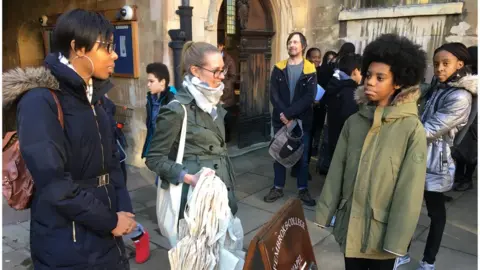
On the coach, Charlene Williams, whose son Ricardo, also 11, wants to be a vet, says she will be looking for reassurance that the university route is best for him.
"You need to study these days to get out of poverty but I need to go and see for myself what the hoo-ha is about."
And Miata Noah, a behaviour support assistant in a school, says she herself dropped out of university before completing her degree.
"My thing is to ask about support for ethnic minorities. I never felt properly supported. It felt as if everyone else was just flying."
Miata's daughter, Kaela-May, 12, is interested in computer science and can already do some coding but wonders "how hard it will be for someone like me to get in to university".
"There's a lot of stereotypical thought.
"People might think that we don't come from a particular background so we don't want something good for the future but really we do."
Miata worries that her daughter is already missing out compared with privately educated pupils.
"Most schools will get you through the exams but they don't teach the sort of critical thinking you need to get through a university interview."
At Cambridge, the group are guests of Pembroke College.
"It's beautiful," says Miata. But she's determined to ask her questions.
"I just want to know how they look after students from poorer backgrounds and help them stay in the same league as their peers."
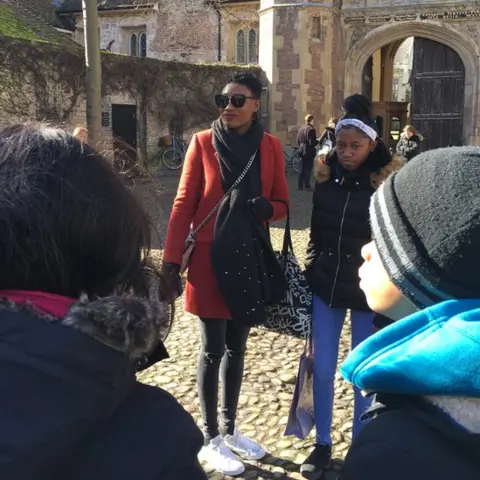
A day of tours and talks is laid on for them, a taster lecture for the children, sessions on teaching, advice on applications, admissions, personal statements, mentoring schemes fees, loans and bursaries.
Lord Smith, Master of Pembroke and a former London MP, was himself a student at the college 40 years ago.
"We want you to think about coming to Cambridge and in particular coming here to Pembroke," he tells the group.
Afterwards he says: "Forty years ago this kind of thing would have been unthinkable. I am really glad it's happening."
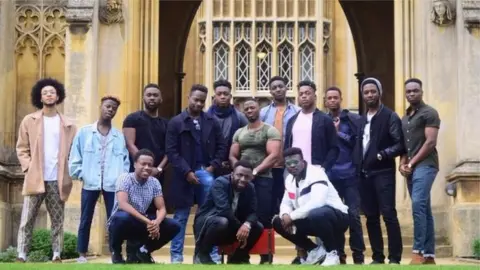 Cambridge ACS
Cambridge ACSThere's a pep talk from Ore Ogunbiyi, of Cambridge's African Caribbean Society, whose photograph of 14 black male students went viral last year with the message that more young black men should apply.
Her advice is to find a subject you love and pursue it with passion and energy - and not to fix on a particular career.
Her parents were determined she should study law.
Then she "was given lots of books and got angry about injustices in a passionate way".
So instead she decided on human, social and political sciences.
"It was a shock to my dad when I went home and told him," she says.
"But university isn't just about getting jobs. And you are going to leave university with transferable analytical skills that will be useful to any job."
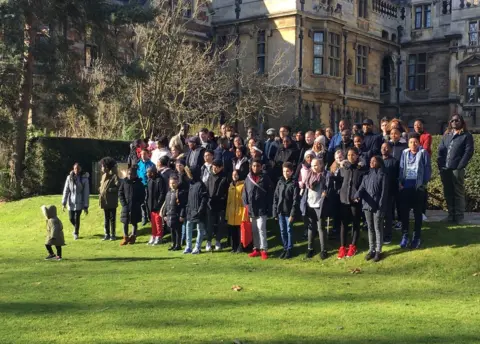
Parents have questions, too. "How successful are your programmes at getting students from non-traditional backgrounds into Cambridge?" asks one.
Daniel wonders about racial diversity among the teaching staff.
"It does make you think, 'How am I supposed to be thriving in academia when they don't look like me?'" admits Ore.
For 14-year-old Jade, finding a subject she is passionate about feels daunting.
"I feel that as a young black girl, in order for me to get a good position in society I need to go to university but I don't know what I want to study. I need to be motivated."
By the end of the day, the group has persuaded the college to consider holding an annual parents' conference to share their tips more widely.
Daniel won his bet - they met about six black students - but he is still convinced that university is the way forward for his son.
"It's about seeing the global world. The best way is education - for yourself. It's not just about getting a job."
On the bus back parents describe the day as "fantastic" and "encouraging".
"Hope. There's hope for our children," says Charlene.
